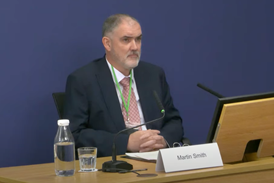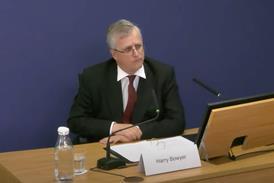What is integrity?
Gregory Treverton-Jones QC and Nigel West recently called for a return to simpler times (Gazette, 17 June), when disciplinary allegations against solicitors were just that, a solicitor’s conduct was unbefitting and the Solicitors Disciplinary Tribunal decided what best to do. They feel that nobody much understands the difference between dishonesty and a lack of integrity, that there is judicial confusion, and paradoxical penalties are the result. A lack of integrity should, they argued, no longer be alleged against solicitors. Notwithstanding the undoubted experience and expertise of the authors, I must respectfully but fundamentally disagree.

The statutory basis for allegations to the SDT is that they are a complaint made by virtue of any provision of the Solicitors Act 1974, which would appear to require allegations to relate to breaches of rules made as delegated legislation such as the SRA Principles 2011. Principle 2 requires solicitors to act with integrity. There is no rule which requires a solicitor to act in a way which is ‘befitting’. If there were, ‘befitting’ would not be an easy concept to pin down.
It is not surprising that ‘integrity’ is the chosen term given that it is one of the professional principles which regulators are required to promote by section 1(3) of the Legal Services Act 2007. It is, in any event, a meaningful term which is consistent with a number of important principles.
As Sir Brian Leveson said in Williams [2017] EWHC 1478 (Admin): ‘Honesty, i.e. a lack of dishonesty, is a base standard which society requires everyone to meet. Professional standards, however, rightly impose on those who aspire to them a higher obligation to demonstrate integrity in all of their work. There is a real difference between them.’
It seems uncontroversial to suggest that solicitors should have an ethical standard higher than simply not being dishonest.
The assessment of professional conduct is a fact-sensitive task for an expert tribunal. It is hardly surprising that concepts such as misconduct, integrity or (dare I say) conduct unbefitting do not result in an express and circumscribed list of impermissible behaviours. In Wingate [2018] EWCA Civ 366, Jackson LJ was able, however, to give numbers of examples of behaviour which lacked the integrity required of a solicitor drawn from decided cases: ‘i) A sole practice giving the appearance of being a partnership and deliberately flouting the conduct rules; ii) Recklessly, but not dishonestly, allowing a court to be misled; iii) Subordinating the interests of the clients to the solicitors’ own financial interests; iv) Making improper payments out of the client account; v) Allowing the firm to become involved in conveyancing transactions which bear the hallmarks of mortgage fraud; vi) Making false representations on behalf of the client.’
It is inevitable that the interaction of culpability and professional rules requires expression in more than one concept. The first is ‘rule breach’, which simply means that a rule has been broken. Second is ‘professional misconduct’, which is a rather hazy term but is generally taken to involve culpability or blameworthiness. Some rules as drafted require misconduct to be breached and some do not. A client account deficiency is a breach even if there is no misconduct. Third is ‘integrity’, which means that the misconduct is inconsistent with the ethical standard required of the profession. Misconduct and rule breaches may be caused by many factors other than a lack of the required integrity – manifest incompetence, rudeness or laziness come easily to mind. The inference from an action which shows a lack of integrity is that the solicitor involved lacks integrity and hence may be ethically unfit to practise. A solicitor who is dishonest must always fall below the required standard of integrity and is almost always treated as no longer meriting the trust required to practise.
Mostyn J’s paradox in Adetoye v SRA [2019] EWHC 707 (Admin) is based on a misconception. It is not possible to say, as he does, that a lack of integrity involves ‘greater moral turpitude’ than dishonesty. Dishonesty is an egregious example of a lack of integrity. There may be conduct which demonstrates untrustworthiness or sharp practice which is not dishonest but lacks integrity because it falls below the higher ethical standard of the profession. The fact that it is a higher standard does not suggest that a breach is more culpable. If anything the opposite is true.
An important requirement for a fair disciplinary procedure is that the defendant knows the case he or she has to meet. This has been regarded by the courts as particularly important when dishonesty is alleged. A solicitor must be under no doubt that his or her character is in question and striking off is a real possibility if the case is proved. The same is true of an allegation of a lack of integrity which must be explicitly pleaded if it is to be open to the tribunal to find it proved.
An allegation that misconduct involves dishonesty has become a proxy indication that the solicitor is ethically unfit to practise. Since honesty is neither the standard of the profession nor at present expressly required in rules, the core allegation, where either dishonesty or a lack of integrity may be found, should be that the breach involves a lack of integrity. If the lack of integrity alleged includes dishonesty, that should also be made clear to the defendant in the pleading as the nature of the lack of integrity alleged. A generic charge of ‘conduct unbefitting’ (even if it had a legal basis) would leave everyone guessing as to what exactly was to be proved and the consequences which might follow.
The appropriate sanction, if a lack of integrity were found, would be specific to the facts and mitigation. The need to maintain public trust is paramount, but not all behaviours which could be found to lack integrity would show a person to be ethically unfit for practice. It seems unlikely that outcomes would change radically. Dishonest solicitors would continue to be struck off. However there may be the odd case where the just outcome for an individual of continuing to practise is compatible with the public interest in maintaining complete trust in the integrity of the profession.
John Gould is senior partner of Russell-Cooke and author of The Law of Legal Services



















![David Lester (senior partner at Blythe Liggins), Darryl Barnes, Jagdeep Sandher (head of dispute resolution at Blythe Liggins)[4]](https://d1d8vslyhr7rdg.cloudfront.net/Pictures/274x183/4/2/8/116428_davidlesterseniorpartneratblytheligginsdarrylbarnesjagdeepsandherheadofdisputeresolutionatblytheliggins4_981603_crop.jpg)







No comments yet